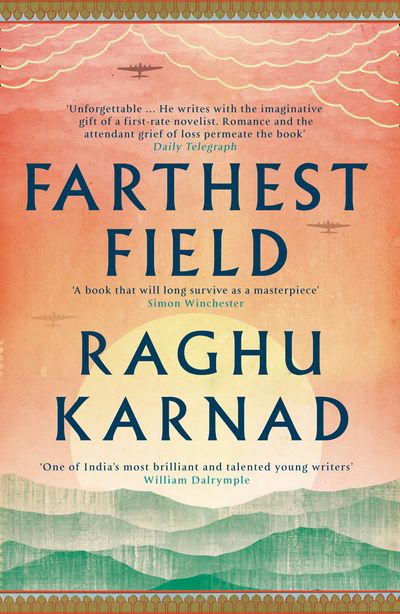Farthest Field: An Indian Story of the Second World War
Described as ‘a masterpiece’ by critics, this remarkable book tells the story of war through the lives and deaths of a single family. Absolutely unforgettable new writing.
If you loved The English Patient or Rohinton Mistry’s Fine Balance or Katherine Boo’s Behind the Beautiful Forevers, you will love this book.
Three young men gazed at him from silver-framed photographs in his grandmother’s house, ‘beheld but not noticed, as angels are in a frieze full of mortal strugglers’. They had all been in the Second World War, a fact that surprised him. Indians had never figured in his idea of the war, nor the war in his idea of India – and he thought that he had a good idea of both.
One of them, Bobby, even looked a bit like him, but Raghu Karnad had not noticed until he was the same age as they were in their photo-frames. Then he learned about the Parsi boy from the sleepy south Indian coast, so eager to follow his brothers-in-law into the colonial forces and onto the front line. Manek, dashing and confident, was a pilot with India’s fledgling air force; gentle Ganny became an army doctor in the arid North-West Frontier. Bobby’s pursuit would carry him as far as the deserts of Iraq and the green hell of the Burma battlefront.
The years 1939-45 might be the most revered, deplored and replayed in modern history. Yet India’s extraordinary role has been concealed, from itself and from the world. In riveting prose, Karnad retrieves the story of a single family – a story of love, rebellion, loyalty and uncertainty – and with it, the greatest revelation that is India’s Second World War.
Farthest Field narrates the lost epic of India’s war, in which the largest volunteer army in history fought for the British Empire, even as its countrymen fought to be free of it. It carries us from Madras to Peshawar, Egypt to Burma – unfolding the saga of a young family amazed by their swiftly changing world and swept up in its violence.
”'[A] spectacular first book … In prose that verges at times on poetry, he writes with the imaginative gift of a first-rate novelist in order to deliver the truth. Romance and the attendant grief of loss permeate the book alongside passages that are unexpectedly moving … Unforgettable” - Daily Telegraph
”'From the very first page it is the brilliance of the writing that stands out. (An) imaginative power, intelligence and descriptive richness of a narrative that, again and again, startles by its originality before convincing by its utter fitness … This book is an affirmation of life, not a polemic against empire or colonial injustice. For all the damning clarity of its political analysis, it is wonderfully generous, full of intelligence, compassion, curiosity and brilliant writing … It has the stamp of imaginative truth about it and we can ask nothing more of any kind of writing” - David Crane, Spectator
”'Fascinating … both a poignant memorial to his lost family and a gripping account of how India contributed to the allied victory” - Sunday Times
”'A bravura feat of literary-historical imagination … Karnad marshals and orders a huge range of materials, locations and actions with apparently effortless skill, making everything cohere not only through a galloping and affecting narrative but, crucially, through a passionate moral core. Karnad’s handling of military action sets the heart racing: the chapters on the Imphal offensive of 1944 should be mandatory reading for writers of action thrillers … The writing of history intersects gloriously with several other genres in this moving, eloquent, intelligent work” - Neel Mukherjee, Financial Times
”'I wanted to savour his prose. That this is Karnad's first book just goes to show that well-crafted writing needs no authorial pedigree … Karnad illuminates brilliantly the 'so much owed by so many” - John Keay, Literary Review
